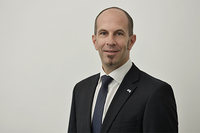
Currently, an in-depth feasibility study and the conceptual design of a first PV project with an electrolysis capacity of 50 - 100 MW near Lviv is underway. This project is the basis for considerations for a subsequent upscaling.
As part of the in-depth feasibility study on central project parameters (technical, economic, regulatory, etc.), the initial assumptions should be confirmed. This forms the basis for detailed project planning/engineering, which is to be carried out in 2022.The results of the feasibility study will serve the project consortium as a decision-making basis for a further phase of cooperation in the development and implementation of the "H2EU+Store" project.
The first quantities of hydrogen could be produced in Ukraine from 2025. These quantities will initially be blended with natural gas in the existing gas pipelines until dedicated hydrogen pipelines are available. This requires technical reviews of the gas pipeline infrastructure and adjustments to the storage infrastructure. The basis for this, however, is a reliable political and regulatory framework. The consortium is evaluating further transport options in order to be able to start the hydrogen ramp-up as soon as possible. In perspective, significant quantities of green hydrogen can be expected from 2030.
The project is structured in phases and is timed to match the development of new Ukrainian renewables (PV/wind/hydro) and electrolysis capacity, as well as the conversion of the transport infrastructure and storage facilities:
Phase 1 (2021 - 2030): Realization of 2.5 TWh/a H2
Phase 2 (2031 - 2040): Increase to 40 TWh/a H2 by 2040
Phase 3 (2041 - 2050): Increase to 80 TWh/a H2 by 2050
Ukraine is considered to be one of the most promising nations for large-scale and high-volume hydrogen production on the mainland of Europe: the land areas, as well as the solar, wind and biogas potential are enormous. In addition, Ukraine also has sufficient water resources.
Also of central importance is the fact that Ukraine, as a neighboring country to the EU, has access to inter-border gas infrastructure.
The hydrogen produced can be transported from Ukraine to Central Europe using the existing gas transit infrastructure. This is supported by the European Commission's Hydrogen Strategy, which recognizes Ukraine as one of the EU's key partners for hydrogen ramp-up.
According to the President of the Ukrainian Hydrogen Council and advisor on hydrogen economics to the Ukrainian Minister of Foreign Affairs, Oleksandr Riepkin, Ukraine has the potential to be a major supplier of the EU’s hydrogen demand.
In addition, the project creates value and technology gains in Ukraine.
Source:
Artikel Hydrogen Economist – 13. April 2022: Ukraine ‘can help meet’ EU hydrogen demand
The implementation of an energy partnership with Ukraine is accelerated by the support of partners along the entire value chain of climate-neutral hydrogen. All project partners therefore welcome broad support for the "H2EU+Store" project. H2EU+Store is open for additional partners along the hydrogen supply chain from Ukraine to Germany. As the project initiator, RAG Austria coordinates potential new members for the project consortium.
Legislative proposals for a new legislative package for the hydrogen and gas markets (including the Fit for 55 package) are currently being worked on at EU level. A legal framework should be introduced promptly to ensure certification, guarantees of origin, labelling and tradability of hydrogen in all member states as well as with third countries. The anticipated hydrogen ramp-up will not take place without an effective legal framework.
Infrastructure conversion/construction must be examined in each case on the basis of regional conditions. The European gas transmission system is already well developed and is therefore an important building block for a climate-neutral energy supply. As part of the European Hydrogen Backbone Initiative, the leading European gas transmission system operators are driving the development of a hydrogen transport infrastructure and developing a common vision for a transnational pipeline infrastructure for 100% hydrogen in Europe. The use of existing gas pipelines for hydrogen transport can save a considerable amount of time and money. By shifting natural gas transports to parallel pipelines or alternative transport routes, individual pipeline systems can be removed from the natural gas system and used as hydrogen pipelines instead. Our partners from the network operator side are continuously working on hydrogen conversion concepts and projects for the development of a hydrogen transport infrastructure within the framework of network development. The Europe-wide integrated hydrogen transport network will be built largely on the basis of the high-performance gas pipeline infrastructure that is already in place today.
In Austria, the Ukrainian hydrogen is mainly fed into the storage facilities of RAG and can be used flexibly and according to demand in all sectors (electricity, mobility, heat and industry) in Austria and Germany.
The hydrogen project "H2EU+Store" is planned for several decades beyond 2050, and as a project consortium we stand united in our commitment to Ukraine's great potential for large-scale hydrogen production.
Contact

Markus Kainz
Project Director H2EU+Store
T +43 (0)50 724 5239
M +43 (0)664 811 9536

Tatjana Weilert
Project Director Infrastructure
T +43 (0)50 724 5238
M +43 (0)664 414 7627
Send E-mail